The Korean Alphabet | A Complete and Definitive Guide to Hangul 한글
The Korean Alphabet (Hangul 한글) ☀️ A Complete Beginner’s Guide
Today we are going to provide you with a definitive guide to the Korean Alphabet, known as Hangul 한글 .
Chances are, you are here because you are interested in Korean and Korean culture? Maybe you have just binge-watched your favourite K-Drama, or you have just finished eating your take-out Bibimbap.
Maybe you just want to learn a new language for fun… but whatever your motive, the Korean Alphabet is an essential starting point for learning Korean.
So on that note, let’s start, shall we!
Korean Alphabet | The History
Korean Alphabet | Hangul Today
Korean Alphabet | Pronunciation
Korean Alphabet | Consonants
Korean Alphabet | Vowels
Korean Alphabet | Double Consonants
Korean Alphabet | Complex Vowels
Korean Alphabet | Complex Consonants
Korean Alphabet | Batchim “받침”
Korean Alphabet | Summary of the Alphabet
Korean Alphabet | FREE DOWNLOAD | THE ENTIRE ALPHABET
Korean Alphabet | TEST YOURSELF | FREE QUIZ
Korean Alphabet | FAQs
To be able to master the Korean language, you have to learn the alphabet called Hangul
Don’t worry, it might look intimidating at first, but you’re in luck.
According to King Sejong The Great, who was the inventor of Hangul…
“A wise man [could] acquaint himself with them before the morning [was] over; a stupid man [could] learn them in the space of ten days.”
Maybe King Sejong was a bit harsh, it did take me a little bit more than that to be totally familiar with the Korean alphabet, but we get his drift!
It might take a little work at the beginning but once you are familiar with Hangul it will be so much easier for you to continue working on your Korean skills.
Perhaps in this instance, it’s better to disappoint King Sejong and take more than ten days to learn Hangul, than start learning Korean on a shaky basis.
Take your time, relax, make a game out of it and we will be there to guide you through the process.
Are you a BTS fan? || Check out these 20+ places ARMY should absolutely visit in Seoul.
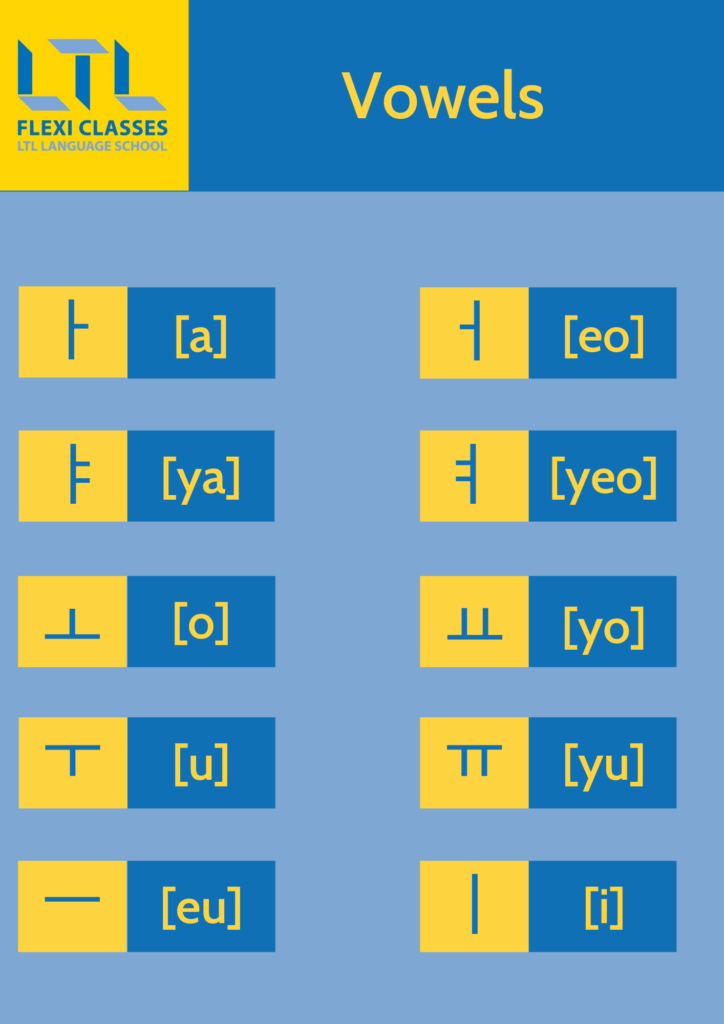
Korean Alphabet | A Quick History Lesson
Before the invention of Hangul, Koreans mostly used Classical Chinese but that was mostly for higher-class Koreans.
Indeed, the difference between the Chinese characters (Hanja) and the pronunciation of Korean words were too different and it was difficult for many to be literate.
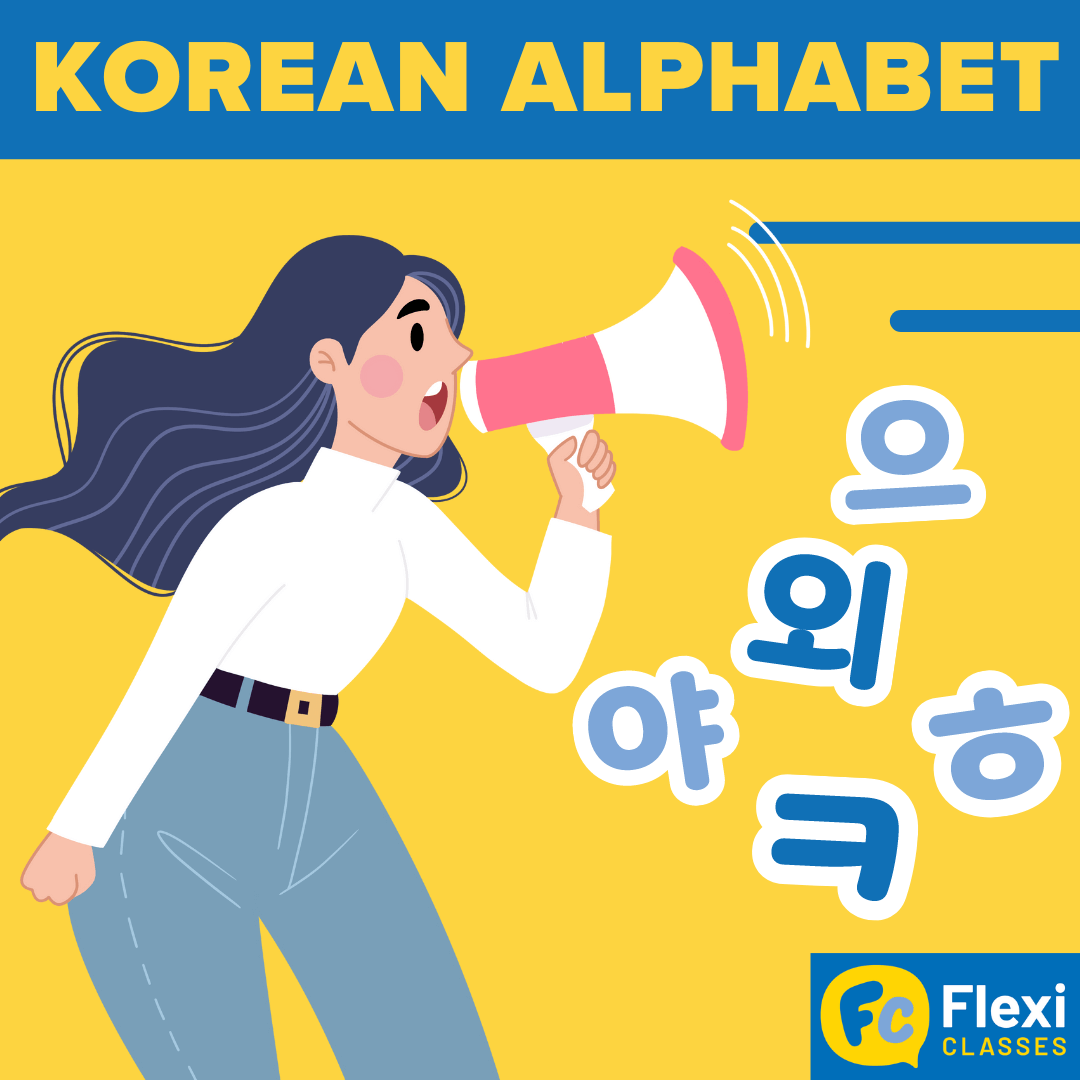
During the Joseon dynasty in 1443, King Sejong designed an alphabet that could be easily read and written by people from all classes.
The goal was to invent an alphabet that was closer to the Korean pronunciation and would mimic the movements the mouth makes when you talk the language.
In the beginning, this alphabet had to face the adversity of scholars (called yangbans). However, it became more and more widely used by women and lower-class Koreans.
Whilst Hangul was still mocked by some intellectuals until the 20th century, now Hanja letters are rarely in use anymore at all, with only a few exceptions (when writing letters for weddings or for New Year’s wishes for example).
Hangul has taken its revenge and is the one that remains in daily use.
Korean Alphabet | Hangul Today
In historical K-dramas, you might see Korean texts written and read top to bottom, right to left just like in Ancient China.
You can also find it today written that way for aesthetic purposes (in poetry for example).
However, these days it is written from left to right and uses western punctuation.
Hangul used to be composed of 28 basic letters, but over the passage of time 4 letters were lost.
Therefore, today only 24 of these remain in Hangul, the Korean Alphabet. 14 consonant letters and 10 vowels.
However, there is more.
After the basic letters of Hangul, you will find two different sets of complex consonants (5 double consonants and 11 complex consonants) and one set of 11 complex vowels, making a total of 27 complex letters.
So just to summarise:
- Hangul includes 24 basic letters
- 14 consonant letters
- 10 vowel letters
- Additionally, there are 27 complex letters formed by combining the basic letters from the above
- 5 tense consonant letters
- 11 complex consonant letters
- 11 complex vowel letters
Korean Alphabet | Pronunciation
If you are quite new to the Korean Alphabet and maybe not familiar with the transcription of phonetics, it might be difficult to get a grasp on the pronunciation at first.
And that’s OK by the way, the sounds are likely nothing like ones that you know.
That’s why in this article we will break down each letter with the phonetics but also with examples of words in English containing that sound, so that it will be easier for you to learn it.
Korean Consonants | All 14 Of Them
OK, let’s learn the Korean Alphabet together!
Korean Consonant #1 is ㄱ
ㄱ “giyeok” g/k [k/] makes the same sound as the g in good. 가방 is pronounced kabang which means bag.
Korean Consonant #2 is ㄴ
ㄴ “nien” n [n] makes the same sound as the n in nose. 노래 is pronounced norae which means song.
Korean Consonant #3 is ㄷ
ㄷ “diget” d/t [t/d] makes the same sound as the d in day. 대한민국 is pronounced dae han min guk which means South Korea.
Korean Consonant #4 is ㄹ
ㄹ “riel” l/r [l/r] makes the same sound as the l in lamp. 라면 is pronounced ra myeon which means ramen.
Korean Consonant #5 is ㅁ
ㅁ “miem” m [m] makes the same sound as the m in moon. 엄마 is pronounced eomma which means mum.
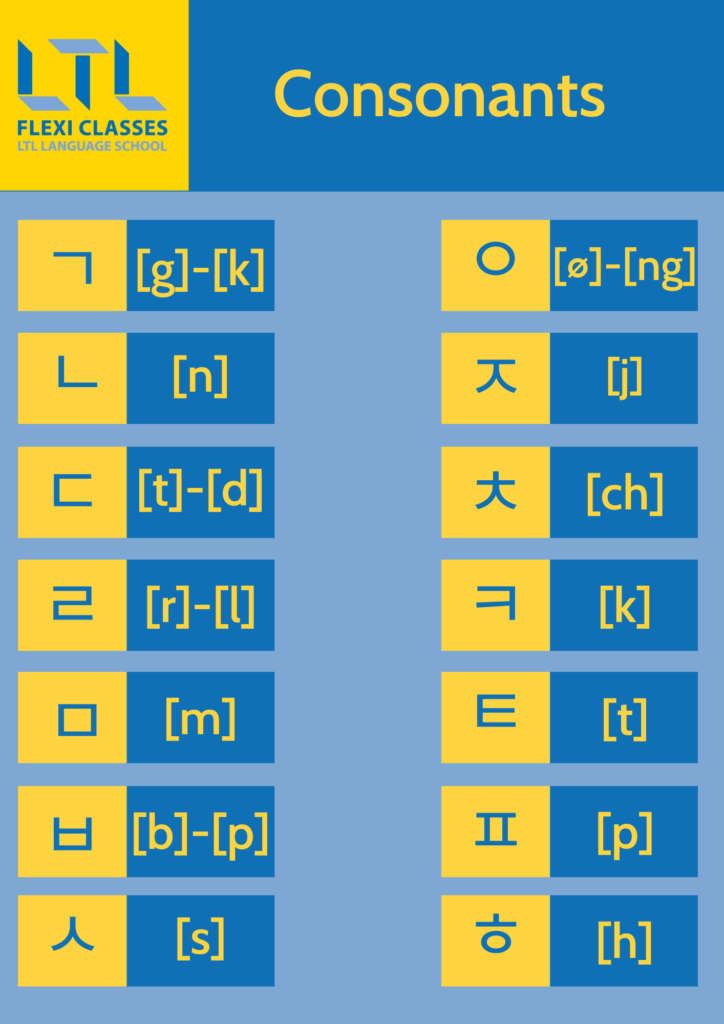
Korean Consonant #6 is ㅂ
ㅂ “biep p/b [p/b] makes the same sound as the b in banana. 밥 is pronounced bap which means rice.
Korean Consonant #7 is ㅅ
ㅅ “shiot” s [s] makes the same sound as the s in spoon. 사과 is pronounced sa gwa which means apple.
Korean Consonant #8 is ㅇ
ㅇ “ieng” silent/ng [ŋ] silent sound or ng sound like in yang. 방 is pronounced bang which means room.
Korean Consonant #9 is ㅈ
ㅈ “jiet” j [ts] makes the same sound as the j in jelly. 지도 is pronounced jido map which means map.
Korean Consonant #10 is ㅊ
ㅊ “chiet” ch [sʰ] makes the same sound as the ch in chair. 친구 is pronounced as chingu which means friend.
Korean Consonant #11 is ㅋ
ㅋ “kiuek” k [kʰ] makes the same sound as the k in kiwi. 커피 is pronounced as kopi which means coffee.
Korean Consonant #12 is ㅌ
ㅌ “tiet” t [tʰ] makes the same sound as the t in table. 토마토 is pronounced tomato which is the same word in English, tomato! This one is easy!
Korean Consonant #13 is ㅍ
ㅍ “piep” p [pʰ] makes the same sound as the p in panda. 팔 is pronounced pal which means arm.
Korean Consonant #14 is ㅎ
“hiet” h [h] makes the same sound as the h in hat. 하늘 is pronounced haneul which means sky.
Korean Vowels | All 10 Of Them
OK first rule to understand with vowels in Korean.
You will never see a vowel written on its own. It is always preceded by “ㅇ” for example “아”, the “ㅇ” being silent. We only pronounce the last letter, which is the vowel.
For convenience, during this lesson, we learn without the “ㅇ”. Just be aware of it when reading the example words we give.
Korean Vowel #1 isㅏ
ㅏ a [a] makes the same sound as the a at the end of santa. 차 is pronounced cha which means car.
Korean Vowel #2 isㅑ
ㅑ ya [ja] makes the same sound as the ya in yahoo. 약속 is pronounced yak sok which means promise.
Korean Vowel #3 isㅓ
ㅓ eo [ʌ] makes the same sound as o in song without the ng sound. 버스 is pronounced bo sseu which means bus.
Korean Vowel #4 is ㅕ
ㅕ yeo [jʌ] makes the same sound as the yo in young without the ng sound. 여자 is pronounced yo ja which means woman.
Korean Vowel #5 is ㅗ
ㅗ o [o] makes the same sound as the o in doll. 봄 is pronounced bom which means spring.

Korean Vowel #6 is ㅛ
ㅛ yo [yo] makes the same sound as the yo in yoga. 요리사 is pronounced yo li sa which means cook/chef.
Korean Vowel #7 is ㅜ
ㅜ u [u] makes the same sound as the u in unicorn. 문 is pronounced mun which means door.
Korean Vowel #8 is ㅠ
ㅠ yu [yu] makes the same sound as the you in youth. 휴가 is pronounced hyu ga which means holidays.
Korean Vowel #9 is ㅡ
ㅡ eu [ɨ] This sound does not exist in English. The best comparison of this sound is when you are confused with something… “uh?”.
아이스크림 pronounced ah e seu keu lim. This one is also quite easy as it means… ice cream! Read the Korean again, see how similar they are!
Korean Vowel #10 is ㅣ
ㅣ i [i] makes the same sound as the y in baby. 아이 is pronounced a e which means child.
Korean Double Consonants | All 5 Of Them
Korean Double Consonant #1 is ㄲ
ㄲ “ssang giyeok” kk [k*] makes the same sound as the k in ski. 꿀 is pronounced kkul which means honey.
Korean Double Consonant #2 is ㄸ
ㄸ “ssang diget” tt [t*] makes the same sound as the t in kitten. 딸 is pronounced ddal which means daughter.
Korean Double Consonant #3 is ㅃ
ㅃ “ssang biep” p [p*] makes the same sound as the p in apartment. 아빠 is pronounced appa which means dad.
Korean Double Consonant #4 is ㅆ
ㅆ “ssang shiot” ss [s*] makes the same sound as the sh in sushi. 쑥 is pronounced ssuk which means mugwort (a traditional plant in Korea used in medicine and cosmetics).
Korean Double Consonant #5 is ㅉ
ㅉ “ssang jiet” [tsʰ] is also a bit tricky because there is no equivalent in the English language.
It is a mix between the J in Jim and the Ch in China.
짜장면 pronounced jja jang myeon which means black bean noodles (a staple of Korean food).
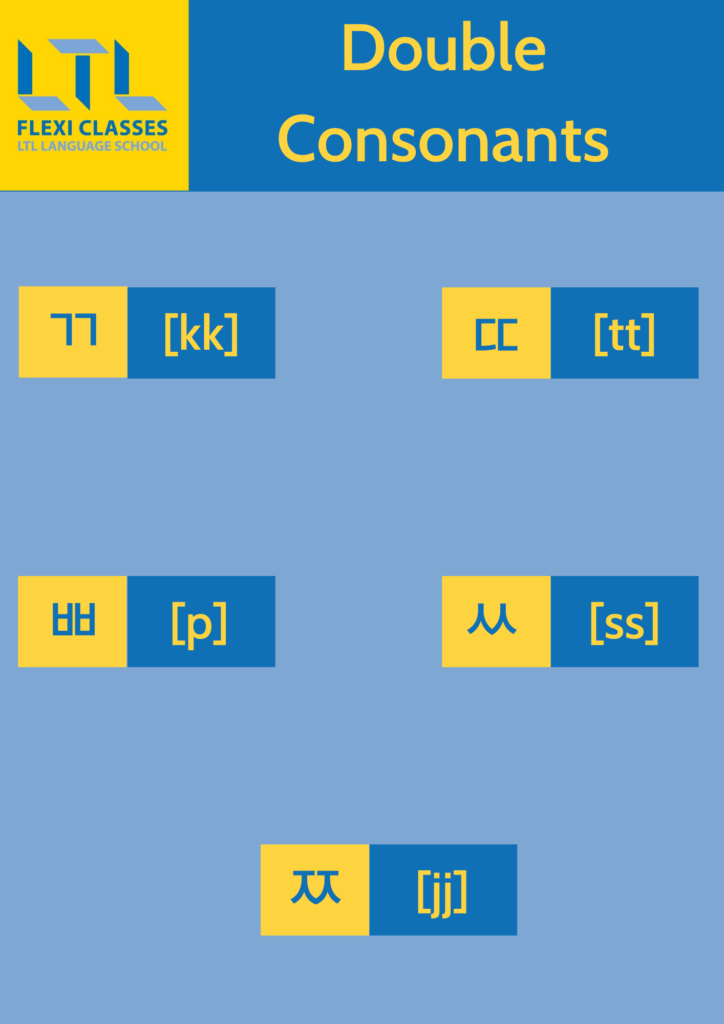
Korean Complex Vowels | All 11 Of Them
Korean Complex Vowel #1 is ㅐ
ㅐ ae [æ] makes the same sound as the a in rare. 개미 is pronounced kae-mi which means ant.
Korean Complex Vowel #2 is ㅒ
ㅒ yae [yæ] makes the same sound as the ya in yak. 얘기 is pronounced yae-gi which means story.
Korean Complex Vowel #3 is ㅔ
ㅔ e [e] makes the same sound as the e in help. 가게 is pronounced ka-ge which means store.
Korean Complex Vowel #4 is ㅖ
ㅖ ye [ye] makes the same sound as the ye in yet. 시계 is pronounced si-gye which means watch.
Korean Complex Vowel #5 is ㅘ
ㅘ wa [wa] makes the same sound as the wo in wow, so a little bit closer to a wa sound.
사과 pronounced sa-gwa which means apple.
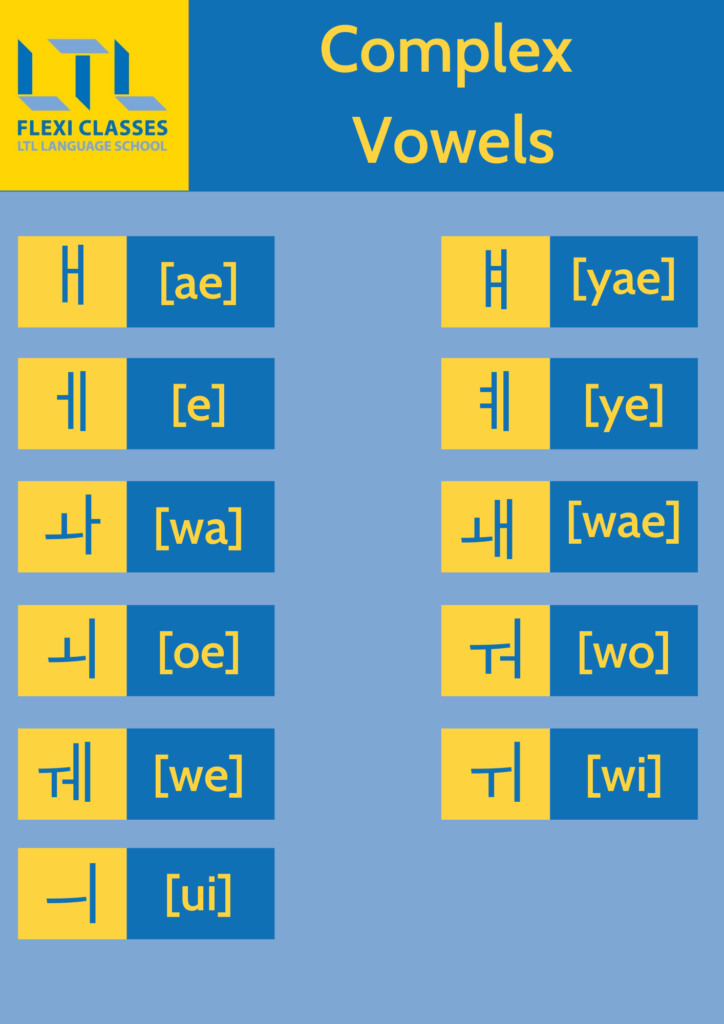
Korean Complex Vowel #6 is ㅙ
ㅙ wae [wae] makes the same sound as the we in wedding. 돼지 is pronounced dwae-ji which means pork.
Korean Complex Vowel #7 is ㅚ
ㅚ oe [we] makes the same sound as the wha in whale. 괴물 is pronounced goe-mul which means monster.
Korean Complex Vowel #8 is ㅝ
ㅝ weo [wʌ] makes the same sound as the who in wholesome. 고마워 is pronounced go-ma-weo and is an informal way of saying thank you.
Korean Complex Vowel #9 is ㅞ
ㅞ wae [wae] makes the same sound as the we in web. It is very similar to the sound ㅙ
Oddly enough even native Korean speakers have difficulties telling them apart.
웨삼촌 is pronounced wae sam-tchun which means maternal uncle.
Korean Complex Vowel #10 is ㅟ
ㅟ wi [wi] makes the same sound as the pronoun we. 귀 is pronounced gwi which means ear.
Korean Complex Vowel #11 is ㅢ
ㅢ ui [ɨj] makes the same sound as the wi in willow. 의사 is pronounced oe-sa which means doctor.
Korean Complex Consonants | All 11 Of Them
Complex Consonants in Korean are a little bit tricky. Why?
Because we have two consonants combined, but we only hear one sound.
There are not many tips and tricks you need to take on board here. It’s simply a case of getting familiar with them, using them and memorising them. The more you use them, the more familiar it becomes. Don’t worry it gets easier with time.
Once you learn a few words containing complex consonants also called a cluster of consonants, you will get used to them quicker than you might imagine!
| Complex Consonant | Actual Sound |
|---|---|
| ㄳ (gs) | g |
| ㄵ (nj) | nj |
| ㄶ (nh) | nh |
| ㄺ (lg) | g |
| ㄻ (lm) | m |
| ㄼ (lb) | b |
| ㄽ (ls) | s |
| ㄾ (lt) | t |
| ㄿ (lp) | p |
| ㅀ (lh) | h |
| ㅄ (ps) | p |
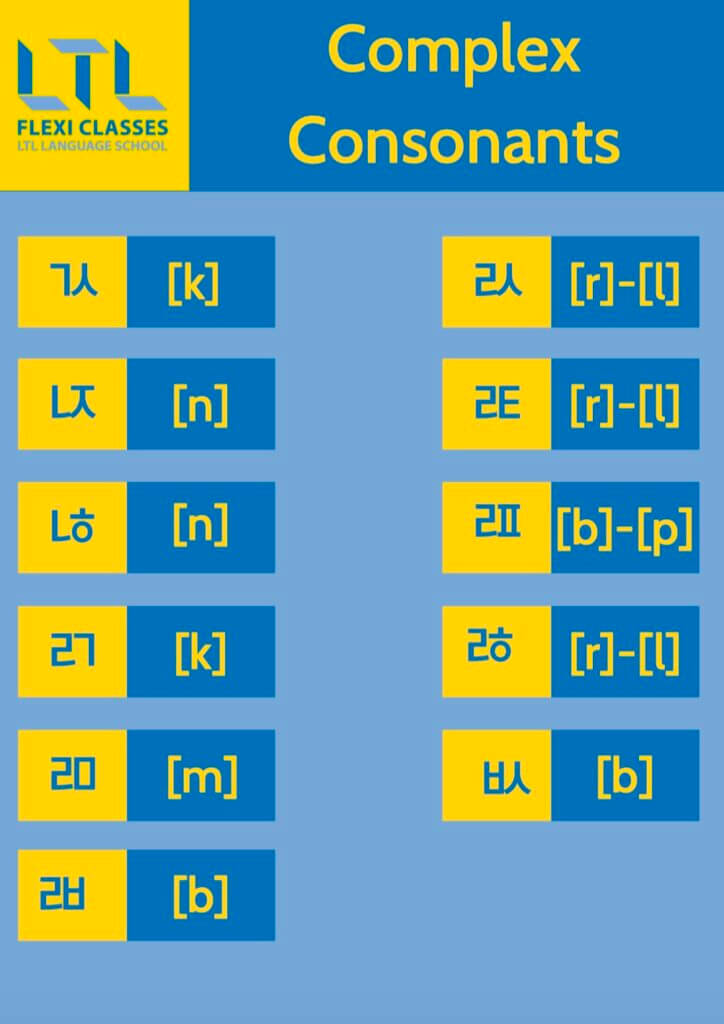
Korean Complex Consonants | Batchim “받침”
We cannot finish this article without mentioning the dreaded Batchim.
This word sends a shiver down the spine of all Korean natives and Korean learners!
Batchim is a very difficult concept to understand when you’re not Korean. If that makes you feel better, even native Korean get them wrong quite often.
In essence – Batchim is a consonant placed at the bottom and pronounced at the end in a Korean syllable block. It makes Korean writing system very unique.
The actual word Batchim “ 받침 ” means to support, which is effectively what it does in a grammatical sense also. It supports other letters from below.
This is something we’ll talk about more in future articles but here’s a quick example:
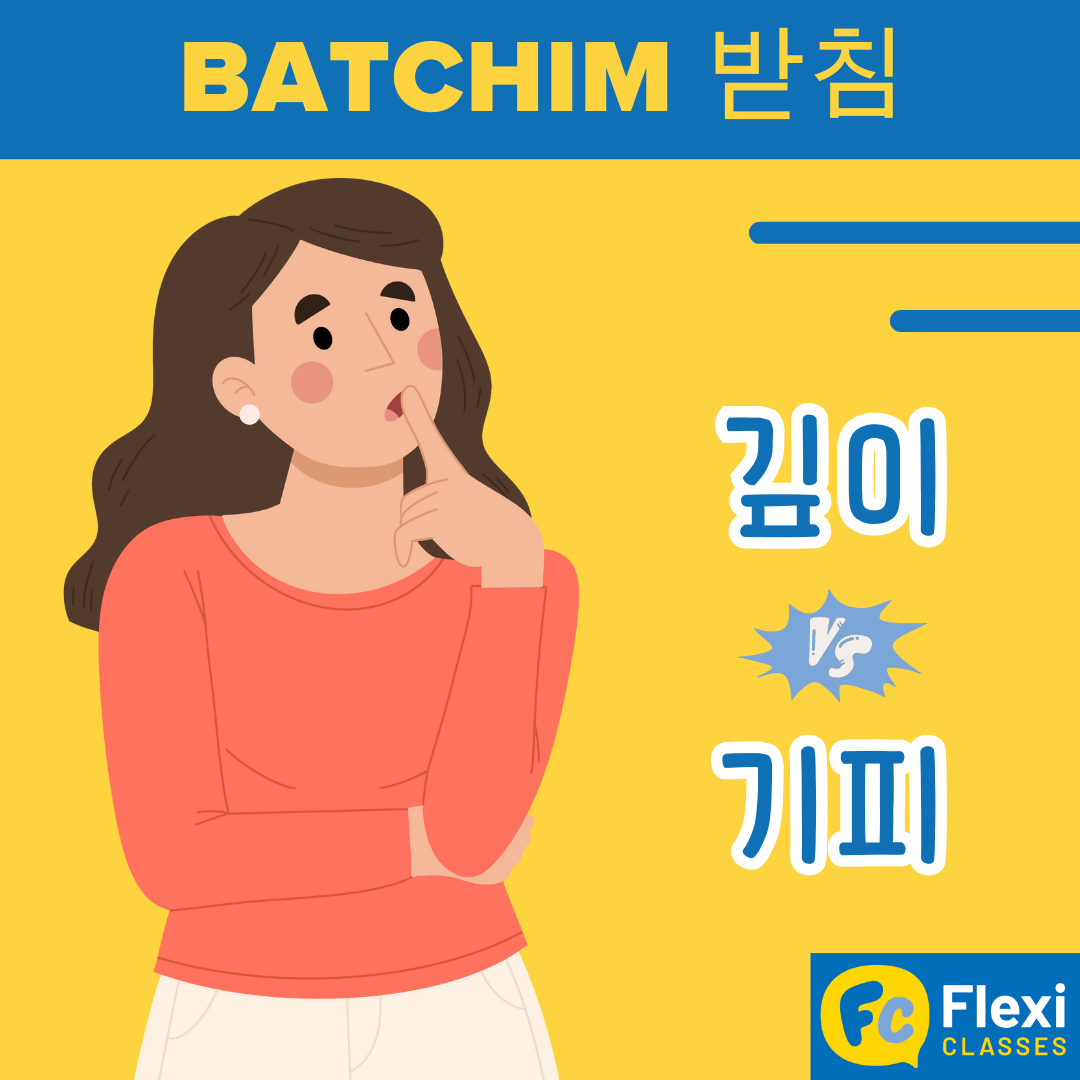
깊이 and 기피 are both romanized as ‘gi pi’.
When spoken they are both also the same ‘gi pi’.
BUT –
- 깊이 means deep or depth
- 기피 means to avoid or evade
As they sound the same, and are romanized the same the Batchim allows us to differentiate the word.
Don’t worry, as we are at the early stages of learning Korean, we don’t need to worry too much about this just yet!
Korean Alphabet | Summary of the Alphabet
OK, we appreciate that was a lot to take it, but let’s take a step back… and take a deep breath!
Hangul is actually not so difficult to pick up.
Once you know it, you know it – like with the English alphabet.
Now whilst that sounds obvious, take a language like Mandarin for example.
DID YOU KNOW – there is no Chinese Alphabet at all!
Chinese is a serious of pictograms and characters that you need to memorise!
That makes learning the Japanese and Korean Alphabets seem a lot less daunting, especially when you consider Chinese has tens of thousands of characters!
Anyway, back to Korean. We wanted to summarise the alphabet in one simple table with their relevant sounds, so here it is.
This is Hangul:
| Hangul | Sound | Example Word | English |
|---|---|---|---|
| ㄱ | g/k | 가방 (ka bang) | Bag |
| ㄴ | n | 노래 (no rae) | Song |
| ㄷ | d/t | 대한민국 (dae han min gug) | South Korea |
| ㄹ | l/r | 라면 (ra myeon) | Ramen |
| ㅁ | m | 엄마 (eom ma) | Mum |
| ㅂ | p/b | 밥 (bap) | Banana |
| ㅅ | s | 사과 (sa gwa) | Apple |
| ㅇ | silent “ng” | 방 (bang) | Room |
| ㅈ | j | 지도 (ji do) | Map |
| ㅊ | ch | 친구 (chin gu) | Friend |
| ㅋ | k | 커피 (ko pi) | Coffee |
| ㅌ | t | 토마토 (to ma to) | Tomato |
| ㅍ | p | 팔 (pal) | Arm |
| ㅎ | h | 하늘 (ha neul) | Sky |
| ㅏ | a | 차 (cha) | Car |
| ㅑ | ya | 약속 (yak sok) | Promise |
| ㅓ | eo | 버스 (bo sseu) | Bus |
| ㅕ | yeo | 여자 (yo ja) | Woman |
| ㅗ | o | 봄 (bom) | Spring |
| ㅛ | yo | 요리사 (yo li sa) | Cook/Chef |
| ㅜ | u | 문 (mun) | Door |
| ㅠ | yu | 휴가 (hyu ga) | Holidays |
| ㅡ | eu | 아이스크림 (ah e seu keu lim) | Ice Cream |
| ㅣ | i | 아이 (a e) | Child |
| ㄲ | kk | 꿀 (kkul) | Honey |
| ㄸ | tt | 딸 (ddal) | Daughter |
| ㅃ | pp | 아빠 (appa) | Dad |
| ㅆ | ss | 쑥 (ssuk) | Mugwort (Korean Plant) |
| ㅉ | ts | 짜장면 (jja jang myeon) | Black Bean Noodles |
| ㅐ | ae | 개미 (kae mi) | Ant |
| ㅒ | yae | 얘기 (yae gi) | Story |
| ㅔ | e | 가게 (ka ge) | Store |
| ㅖ | ye | 시계 (si gye) | Watch |
| ㅘ | wa | 사과 (sa gwa) | Apple |
| ㅙ | wae | 돼지 (dwae ji) | Pork |
| ㅚ | oe | 괴물 (goe mul) | Monster |
| ㅝ | weo | 고마워 (go ma weo) | Thank You |
| ㅞ | wae | 외삼촌 (oe sam chon) | Uncle |
| ㅟ | wi | 귀 (gwi) | Ear |
| ㅢ | ui | 의사 (oe sa) | Doctor |
Then to complete the line-up the Complex Consonants:
- ㄳ gs [g] – We only pronounce the [g] sound
- ㄵ nj [nj] – We pronounce it as [nj]
- ㄶ nh [nh] – We pronounce it as [nh]
- ㄺ lg [g] – We only pronounce the [g] sound
- ㄻ lm [m] – We only pronounce the [m] sound
- ㄼ lb [b] – We only pronounce the [b] sound
- ㄽ ls [s] – We only pronounce the [s] sound
- ㄾ lt [t] – We only pronounce the [t] sound
- ㄿ lp [p] – We only pronounce the [p] sound
- ㅀ lh [h] – We only pronounce the [h] sound
- ㅄ ps [p] – We only pronounce the [p] sound
FREE DOWNLOAD | Our Korean Alphabet PDF
Hopefully, you’ve seen by now when we discuss and teach topics, we don’t brush over the details and leave you to do the rest, we dig deep!
We take great pride in providing content that few others can compete with.
Sure we’ve taught you the Korean Alphabet, but who else would spend all this time creating graphics, PDF’s and quizzes for you to utilise also?
That’s where we come in!
So, to summarise everything you’ve read up until now, here is a super useful PDF with all the Korean letters in a handy PDF.
Print it, review is, share it, download it – do what you want! We hope it’s useful.
Once you feel ready to tackle Korean further… our quiz below awaits!
Need to practice your handwriting as well?
Check out our Handwriting Practice Worksheets, all ready to print:
DID YOU KNOW – Japanese has three alphabets! Don’t worry though, we wrote a super guide to make it all very easy to understand! Check it out here – the guide to Japan’s 3 Alphabets.
We’ve also provided extensive articles about the Chinese Alphabet (or lack of), Russian Cyrillic Alphabet and the Vietnamese Alphabet as well.
TEST YOURSELF | OUR KOREAN ALPHABET QUIZ
Now then… ready to test yourself?
Don’t worry, all answers to the 20 questions are in the blog you’ve already finished reading so it shouldn’t prove too hard!
There’s a mixture of vowel and consonant recognition along with a few of the words we mentioned above.
Good luck, and do share your scores below!
Korean Alphabet | FAQs
How many letters are in the Korean Alphabet?
Today there are 24 letters in Hangul, the Korean Alphabet.
14 consonant letters and 10 vowels.
What is the Korean alphabet called?
The Korean Alphabet is known as Hangul 한글 in Korean.
How many vowels are in the Korean Alphabet?
There are 10 vowels in the Korean Alphabet.
How many consonants are in the Korean Alphabet?
There are 14 consonants in the Korean Alphabet.
How many additional complex letters are in the Korean Alphabet?
There are 27 complex letters formed by combining the basic letters.
11 complex consonant letters
11 complex vowel letters
5 tense consonant letters
When was Hangul created?
During the Joseon dynasty in 1443, King Sejong decided to create an alphabet that could be easily read and written by people from all classes.
Thus Hangul, the Korean Alphabet as we know it today, was formed.
How many double consonants are there in the Korean Alphabet?
There are 5 double consonants in total which are:
ㄲ
ㄸ
ㅃ
ㅆ
ㅉ
How to learn the Korean alphabet?
A good place to start would be learning Hangul – the Korean alphabet.
After that, you’ll want to get speaking to a native speaker, Flexi Classes is the perfect place to do that.
We even offer a 7 day free trial.
Want More From LTL?
FANCY LEARNING KOREAN? Check out our online Korean courses here.
We offer a 7-day free trial to all online students where you can study Korean 24/7.










100 comments
Loving the graphics
Thanks Craig 🙂
i want to learn more,
파이팅 😎
This is really helpful and I took a lot of notes now I still have to pronunciation and how to write sentences but I really enjoyed this website
Hi Caitlyn - thanks a lot for comment, we are really pleased you enjoyed the article and our website 🙂
Thanks for guidance. I'm a new learner in Korean language and your slide is really help me a lot. Again, Thank you very much
Hello Jennie, thank you very much for your comment, we are very happy to see our blog could help you with your Korean studies! Make sure to come back from time to time as we regularly post new content. Keep up the good work!
thanks, a lot of this opportunity. Annyeong haseyo.
Most beautiful alphabet in the world, don't @ me otherwise
Hard to disagree!
Hi there, just noticing a mistake
In your table for 밥 you’ve put the English translation as banana instead of rice/meal (or maybe it’s that you’ve put 밥 instead of 바나나)
Thanks for noticing Astra but we meant the sound is like the B in Banana, and you can see the sentence then shows Rice just after 🙂
Hope that clears it up.
"ㅂ “biep p/b [p/b] makes the same sound as the b in banana. 밥 is pronounced bap which means rice."
I got full marks in the quiz, thanks for setting that up. it's really good
That's excellent, well done Dex
hangul genuinely took me a day to learn, piece of cake !
Good man, that's a sound effort!
I learnt it within a week, really not hard and really lovely to read
That's great work!
Batchim does my head right in!!
Definitely not the first person to say that sentence!!
hard,but trying
fighting
You got this!
16 correct and 4 incorrect 🥺❤️
Very nice effort!
I Am 작시 , and actually I am self taught learner ,i am so blessed to have this lesson , i got to know a lot about hangeul history n all stuff , thanku so much for this amazing content ❣️
Our pleasure 작시
I got 20 points.. yahooo
Well done!
I learnt 한글 in about 3 days. It's really quite easy!
That's great, well done Gabe. It's not that hard at all is it! The King wasn't wrong 😅
I keep putting Korean off, time to get started
That's the attitude, we are here to help!
I learnt 한 국 in 2 days and it was fun to learn and it's easy to learn if you really want to learn Korean and I'm so glad that this lesson was really blessed for me Thank you very much that I learnt a lot from this and will learn.Anyone who wants to learn Korean keep going and 화이팅........
Thanks so much Shruti, we're really pleased we could help encourage you to make progress. Keep it up, welcome to take some Flexi Classes with us too 🙂
hello
Hi there 🙂
Hello @marine am being honest to you and your site to give best ever teachings in foreign languages, am being very helpful by you
Thank you so much!
100% in the quiz!!
GO ON PAM!!
Such a beautiful alphabet. I love it and it's so easy to learn
Absolutely right on both fronts Harry!
[…] + 여기서 자세히 보기 […]
Good
[…] + 여기서 자세히 보기 […]
I got 18 correct and 1 incorrect. Thankyou
Nice score, you certainly know how to curse in Korean now. Just hope you never need to use them!
[…] + 여기서 자세히 보기 […]
ITS first step of learning korean and it helps me a lot and I have to do my best because I have to go to South Korea after 2 years and I hope it will help me .
Good luck and hope to see you in Korea soon!
Hey I got full marks. I want good teacher to teach me KOREAN . Iam really interested in the language. Thanks
Brilliant work Jessica! If you want a teacher come and try our Flexi Classes, we've got plenty of Korean teachers waiting for you - https://flexiclasses.com/flexi-registration
Best learning platform for people who want to learn Korean. I really wanted to learn Korean fluently and I was thinking that basic is so complecated but its very easy to understand.
😎
slay max hobbs yaaas get it
[…] After the basic letters of Hangul you will find two different sets of complex consonants (5 double c… […]
i hope there is an android app for this website for free
This is definitely helpful for korean learners and beginners.
Very happy to hear it Manisha 🙂
i like it.. i realy to learn reading and writing korean language.. thanks for guide . keep it up 👏👏
Thanks Jay, glad you enjoyed
[…] + 여기서 자세히 보기 […]
Nice
Thanks 🙂
I got 18 and 2 incorrect, I'm so happy I'm improving in learning hangul with you
Well done, that's a great score
i love it
Thanks for your comment 🙂
I have always like watching kdrama and listen to korean song. Recently I have returned from my first trip to Korea and it makes me really want to start learning. Thus, have chance upon your website and it is really a great platform for a starter to learn them. Thank you.
We are very happy to read your kind words, and welcome in the Korean language learning sphere! Have you checked our Flexi Classes platform yet? You can study any level of Korean 24/7 by choosing when and what to study, we also have a 7 Day Free Trial available. Let us know if you have any questions, Marine
[…] + 여기서 자세히 보기 […]
really want to learn korean cos am travelling there
Welcome to study with Flexi Classes 🙂
SIGN UP HERE || https://flexiclasses.com/flexi-registration/
I've wanted to work for some of my favorite south korean publishing companies! I decided to pick up learning so maybe one day, I can try applying to them. Wish me luck!
Good luck Joselyn! You got this, we'll be here to help whenever you need.
[…] https://flexiclasses.com/korean/alphabet/#chapter-10 […]
yeay got full marks! loving the websites! thank you!
Yay!! Well done Ann, really glad you are enjoying the website
I have 18 right and i failed in 2 quastions
i'm so happy for this experience
Super work Janet, well done
Didnt expect that
I got 14 correct and 6 wrong but I'm proud of myself.
That's a great effort Daya, keep on learning 🙂
[…] Korean Alphabet 한글 ☀️ Beginners Guide (+ Free Quiz … […]
Very Informative Website. Colourful charts. : )
Thanks Alan, we do our very best!
[…] Korean Alphabet 한글 || (+ Free Flashcards + Quiz) […]
I got 20 over 20.😊😊😊
[…] Korean Alphabet 한글 || (+ Free Flashcards + Quiz) […]
I enjoyed answering the quiz. Got a perfect score!😁
Wooo, you know your Hangul Krislee! Well done
very encouraging and a fast learning way of the korean language. I am like wow!! i will get to the end period!!!!
You say Hangul is an alphabet, but it's technically a featural writing system. It's like calling the Arabic script a syllabary. Speaking of syllabaries, you also call Japanese an alphabet, even though Japanese doesn't even have one singular writing system. Even if you were talking about all three at once, none of them are alphabets. There are two syllabaries and a logographic writing system. Notice how I didn't say there was an alphabet. You also say Mandarin when talking about Mandarin (good so far) but then call it Chinese twice after that. You can say Mandarin Chinese or just Mandarin, but not just Chinese. Chinese are the people, not the language.
Sorry, I just felt like you were calling any writing system an alphabet. It's very English-centric.
Thanks for sharing your thoughts 🙂
hi i wonder if anyone can help i am trying to type double consonants together 딸 like this one i do have a Korean key pad on my phone but no matter how hard I try it wont come out looking like it should i am having problems with other words with double consonants as well any hints would be welcome thanks
Hi! Have you tried pressing shift whilst typing double consonants? 🙂
[…] repeated writing and use flashcards, which can help reinforce memory. Websites like Flexi Classes offer free flashcards and quizzes to help with this […]
[…] For a thorough breakdown of the Korean alphabet, consider visiting Flexi Classes Korean Alphabet. […]
This is a really helpful and underrated site